|
|
|
Sort Order |
|
|
|
Items / Page
|
|
|
|
|
|
|
| Srl | Item |
| 1 |
ID:
167577


|
|
|
|
|
| Summary/Abstract |
Each year over the last decade, there were on average 400 humanitarian disasters or emergencies, killing more than 100,000 people and affecting a further 200 million. Such humanitarian events require immediate responses as well as effective longer-term activities to aid communities recover. The global response is now valued over US$27 billion annually. More than half a million people are estimated to work in this sector, the majority being locally engaged staff. The international community provides significant resources to assist local communities impacted by these humanitarian emergencies. This aid flows through multiple channels, including national and regional governments, international non-governmental organisations and local community based organisations. Increasing the skills and knowledge of leaders and managers of these responses is a critical need to ensure the most effective recovery in communities as well as use of resources. Understanding the professional journey in the humanitarian sector is vital, but currently limited. As the humanitarian sector continues to expand, greater focus on the skill-set needed by humanitarian workers responding to these events is needed. However, tensions exist between the primacy given to the experiences and soft-skills of humanitarian workers over the value of academic qualifications. This paper provides some suggestions how this tension within the humanitarian sector may be addressed and reconciled. This paper presents new data based on interviews with 20 humanitarian professionals from a range of humanitarian aid agencies and considers their experiences and reflections on building a career within the humanitarian sector.
|
|
|
|
|
|
|
|
|
|
|
|
|
|
|
|
| 2 |
ID:
144743


|
|
|
|
|
| Summary/Abstract |
The UK's changing political and legal landscape since 2000 reflecting transformations in wider society have elevated equality and diversity (E&D) issues to prominence in the public sector, including in the British armed forces. This research highlights key developments in the British military in relation to E&D, focusing both on areas of progress, and on the challenges still confronting the Forces. The findings reveal that the Forces have made significant strides in advancing E&D through the implementation of a range of policy initiatives but the persistence of discrimination, developments in the wider environment and the dilemmas raised by the strands of age and disability pose challenges. The value of this research is to increase our understanding of diversity management in a public sector institution that has been under-researched and views itself as “different,” and will be of interest to policymakers, E&D practitioners and academics in the field.
|
|
|
|
|
|
|
|
|
|
|
|
|
|
|
|
| 3 |
ID:
129731
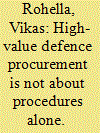

|
|
|
| 4 |
ID:
060169
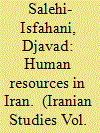

|
|
|
| 5 |
ID:
100962
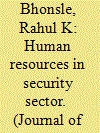

|
|
|
|
|
| Publication |
2010.
|
| Summary/Abstract |
The challenge of management of human resources may be the most profound in the security sector in the years ahead given transformations happening globally and enhancement of human potential and opportunities for individual growth. The national security sector extending from the military to private security guards denotes the plethora of skills sets required which vary from that of handling highly sophisticated and lethal missile arsenal, to commandeering large aircraft carriers and submarines to securing public space in metropolitan cities. Selection, training, motivation and incentivizing the force will be a major challenge for the 21st Century. The need of the hour is, therefore, to have an integrated human resource development policy so that lateral skills can be utilized across the three spectrums of defence, paramilitary and police and private security and enhance talent utilization through motivation. It argues that this will lead to effective and economic utilization of manpower with national ownership rather than as a stove piped resource, corresponding savings to the ex-chequer while adding to proficiency of security forces.
|
|
|
|
|
|
|
|
|
|
|
|
|
|
|
|
| 6 |
ID:
143829
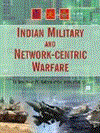

|
|
|
|
|
| Publication |
New Delhi, Wisdom Tree, 2014.
|
| Description |
xxiii, 271p.hbk
|
| Standard Number |
9788183283625
|
|
|
|
|
|
|
|
|
|
|
|
Copies: C:1/I:0,R:0,Q:0
Circulation
| Accession# | Call# | Current Location | Status | Policy | Location |
| 058474 | 355.020954/KAT 058474 | Main | On Shelf | General | |
|
|
|
|
| 7 |
ID:
092019
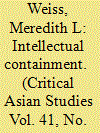

|
|
|
|
|
| Publication |
2009.
|
| Summary/Abstract |
Postcolonial, developmental states recognize the need for higher education to generate both ideas and skilled human resources. Many seek too, though, a level of state control incompatible with ideals of academic freedom. This dilemma is all the more keen for semidemocratic states such as Malaysia and Singapore, which can neither curb protest as coercively as their more authoritarian neighbors do nor accept free-wheeling criticism as more politically liberal ones do. Presumed morally "pure" and entitled to speak, students across Southeast Asia are heir to a tradition of political engagement, based largely on their identity as students. Despite crackdowns, students have been central to political change across the region. They remain so in much of Asia-but not, for instance, in Malaysia. The muting of student protest there may be traced in large part to a post-1969 process of intellectual containment, or normative delegitimation and historical erasure of student activism, with far-reaching implications.
|
|
|
|
|
|
|
|
|
|
|
|
|
|
|
|
| 8 |
ID:
106706
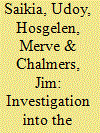

|
|
|
| 9 |
ID:
124219
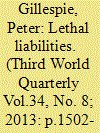

|
|
|
|
|
| Publication |
2013.
|
| Summary/Abstract |
In the mid-1980s I had the opportunity to work with the National Federation of Sugar Workers, the union of sugar plantation workers in the Philippines. It was a desperate period in Negros Occidental, the main sugar-producing island. Sugar prices had fallen worldwide. The end of a preferential trade agreement with the USA had resulted in a dramatic decline of sugar exports to the American market. The economy of Negros had collapsed. Starvation among workers and their families was setting in .
|
|
|
|
|
|
|
|
|
|
|
|
|
|
|
|
| 10 |
ID:
156499
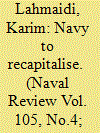

|
|
|
| 11 |
ID:
182559


|
|
|
|
|
| Summary/Abstract |
Ageing workforces due to low fertility rates and higher life expectancies challenge modern industrialized economies. In order to secure economic welfare and to balance public budgets, governments worldwide implement reforms to increase the retirement age. The trend towards a higher retirement age confronts defense sectors that for centuries have been in search of an age structure characterized by ‘youth and vigor’. In this article, we study the economic gains to society when the special retirement age for military personnel in the Norwegian Armed Forces is increased. Combining the literatures on pension, personnel, and military economics, we identify mechanisms crucial to the outcome of a special retirement age reform. Monte Carlo simulation is applied to illustrate the potential impact on the economic net gains of uncertain variables. We find that an increase in the retirement age provides substantial net benefits to society, even under fairly negative assumptions about the consequences for retention, motivation and efforts, and the value of elderly personnel in the Norwegian Armed Forces.
|
|
|
|
|
|
|
|
|
|
|
|
|
|
|
|
| 12 |
ID:
039765


|
|
|
|
|
| Publication |
Edinburgh, Oliver and Boyd, 1984.
|
| Description |
296pPbk
|
| Series |
Conceptual Frame Works in Geography
|
| Standard Number |
0050035258
|
|
|
|
|
|
|
|
|
|
|
|
Copies: C:1/I:0,R:0,Q:0
Circulation
| Accession# | Call# | Current Location | Status | Policy | Location |
| 024799 | 910.091716/BAR 024799 | Main | On Shelf | General | |
|
|
|
|
| 13 |
ID:
131229
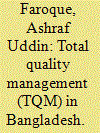

|
|
|
| 14 |
ID:
132161
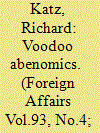

|
|
|
|
|
| Publication |
2014.
|
| Summary/Abstract |
Imagine the predicament currently facing a growing number of Japanese men in their early 30s. Despite having spent years cramming in high school and attending good colleges, many can't find a full-time job at a good company. Since Japan's rigid labor laws make it nearly impossible to lay off permanent employees in downtimes, companies now tend to fill open slots with part-time or temporary workers, and they typically pay them a third less. Today, 17 percent of Japanese men aged 25 to 34 hold such second-class jobs, up from four percent in 1988. Low-paid temps and part-timers now make up 38 percent of Japanese employees of all ages and both sexes -- a stunning figure for a society that once prided itself on equality.
|
|
|
|
|
|
|
|
|
|
|
|
|
|
|
|
|
|
|
|
|